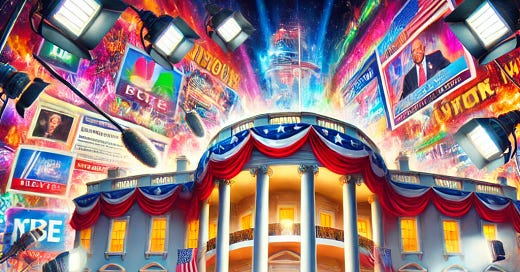Political spin is as old as politics itself. Politicians have always framed issues to present themselves in the best light. As with most political trends, Donald Trump did not create this phenomenon—he has simply taken it to the next level. Trump is to the presidency what The Bachelor is to dating. Yes, some successful relationships have come from it, and real emotions exist, but for the most part, it is predictable, overdramatic, and heavily manipulated for public consumption.
In a previous article, I questioned why Trump’s second term had started with hostility and aggression in foreign relations. His supporters would call it strategic genius, but the real answer might be surprisingly simple—it makes for great television.
America First Bravado
The Trump administration’s America First doctrine claims to operate under the principle of “peace through strength”, an idea with roots in ancient history. Strength has always been essential to maintaining peace and stability in international relations. A nation unable to enforce its will cannot deter enemies or shape global events in its favor. However…
Manufacturing Crises and Solutions
On January 29, President Trump dramatically announced on Truth Social that he had asked SpaceX to “go get” two “abandoned” astronauts at the International Space Station stranded due to Boeing’s failed Starliner. Musk readily responded, saying he would do as Trump commanded and rescue them as soon as possible. There is just one problem—NASA asked SpaceX to bring the astronauts home months ago. As soon as the astronauts were stuck, NASA commissioned SpaceX to find a solution. SpaceX had originally planned to rescue them in September but requested more time.
This is a simple but illustrative example of the new reality TV presidency. Nothing changed. No new action was taken. But Trump’s supporters will credit him, anyway, accepting his version of events at face value. They will tune in again next week for the thrilling conclusion, while in reality, the situation remains unchanged.
A far more significant example comes from the standoff with Canada over tariffs. After weeks of threats and Truth Social posts, planned tariffs against Canada were set to take effect. Contracts were canceled, markets crashed, and the world braced for impact. Then, at the last moment, a reprieve—Trump agreed to hold off on tariffs in exchange for Canada doing exactly what it had already promised to do a month before he took office. Even if Canada adjusts its policies or timelines, was the manufactured crisis necessary? No—but for a reality TV star president, the theatrics were essential.
Mexico followed the same script. Under threat of tariffs, it agreed to send 10,000 National Guard troops to its border. This is identical to what happened in June 2019, when Trump threatened tariffs and Mexico responded in kind. More importantly, it is the same commitment Mexico made in April, months before Trump took office. Biden secured the same outcome—just by asking. As with reality TV, the optics matter far more than the actual results.
Drama as Policy
These are just a few examples. Many of Trump’s attention-grabbing executive orders amount to PR stunts. His order to “end weaponization” lacks concrete actions or examples, with “weaponization” itself becoming a vague catchall for government actions he dislikes.
His so-called “instructions” to obliterate Iran if they assassinate him offer another example of meaningless, made-for-TV nonsense. Even if he were killed, he would cease to be president at that moment, rendering any instructions he left behind irrelevant. The gesture is purely performative, designed to heighten the drama and reinforce his brand.
For Trump and his supporters, it is all part of the show. The theatrics create the illusion that he is in charge, making bold decisions. Leading up to Trump’s inauguration, many of his supporters—including Mel Gibson—made bizarre references to “Daddy” being home. It is an absurd way to describe the President of the United States, but it highlights the reality TV atmosphere Trump cultivates. More than any president since Reagan, and comparable to only a few in history, Trump has transformed himself into a brand. His supporters are not just voting for a set of policies—they are investing in the brand. And keeping a brand alive requires fresh marketing, new plot twists, and ever-escalating drama.
The Hidden Costs of the Show
Beyond the strain this spectacle places on international relations, it creates real consequences at home. Take the decision to remove General Mark Milley’s picture from the Pentagon and strip his security detail. In the long run, these actions may not shift U.S. policy, but they send a clear message to anyone within the administration who dares to dissent.
Democrats must resist the urge to respond with equal drama. As Chris Cillizza put it, they cannot keep “swinging at every pitch.” Articles of impeachment concerning Gaza from Rep. Al Green or obsessing over a DOGE staffer’s past tweets only serve as sideshows to Trump’s theatrics. The real threats lie elsewhere—specifically, in his willingness to erode the checks and balances of the Constitution.
An addiction to drama distracts from the issues that truly matter. Worse, maintaining an audience requires an ever-escalating spectacle. Psychologist Scott Lyons, in an interview about his book Addicted to Drama, observed: “That part of me that felt like drama was the only way to be seen. My inner victim really sought the conditions that reinforced its identity.”
Trump consistently casts himself and his movement as victims, and there is real danger in a political movement that sees drama as its primary means of self-expression. I once heard a software executive warn a room full of engineers to be wary of colleagues who find their value in solving crises —because soon enough, they will start inventing crises to solve. Like a firefighter who becomes an arsonist, an addiction to drama demands ever-bigger fires. And who is to say who will get hurt—or what will be destroyed—in the process?








